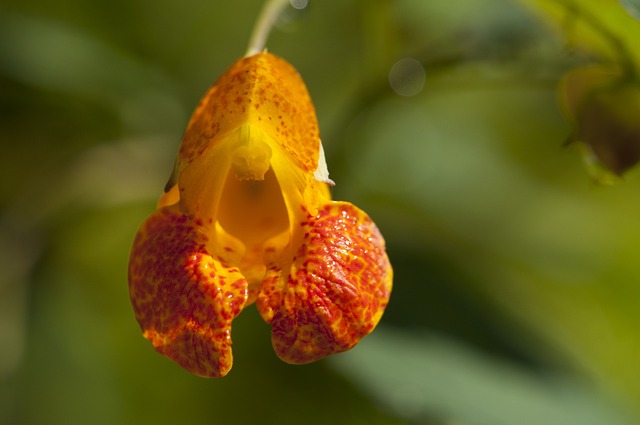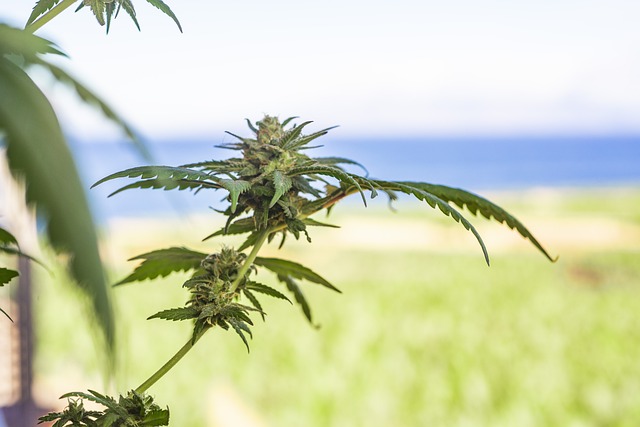
The THCA flower, a non-psychoactive component of raw cannabis plants, is being studied for its anti-inflammatory properties. It interacts with the endocannabinoid system to potentially alleviate inflammation and pain associated with conditions like arthritis and skin disorders by inhibiting pro-inflammatory cytokines and enzymes. The compound is believed to modulate immune responses through its interaction with CB1 and CB2 receptors, offering a natural alternative for managing inflammatory conditions. While THCA flower has shown promise as an anti-inflammatory agent, similar to its psychoactive counterpart THC but without mind-altering effects, it is important to approach its use with caution due to potential side effects like drowsiness and dry mouth. The safety and efficacy of THCA flower are still under investigation, and it is crucial for individuals to consult healthcare professionals before using it, especially if they have existing health issues or are on other medications. The article emphasizes the need for more clinical trials to fully understand THCA's therapeutic benefits and ensure its safe integration into treatment protocols, adhering to local laws and regulations throughout the process.
Exploring the therapeutic properties of THCA flower, this article sheds light on its anti-inflammatory effects and potential health benefits. Delving into the mechanisms that make THCA a subject of interest in pain and inflammation management, we also examine the known side effects associated with its use. Understanding the nuances of THCA’s impact on human health is crucial for safe and effective application, as outlined in our comprehensive analysis across various sections. Join us as we navigate through the evidence-based findings, usage considerations, and precautions surrounding this emerging area of natural medicine.
- Unraveling the Anti-Inflammatory Potential of THCA Flower: A Deep Dive into Mechanisms and Benefits
- Navigating the Effects of THCA Flower on Human Health: An Exploration of Known Side Effects and Considerations for Usage
- The Role of THCA Flower in Inflammation and Pain Management: Evidence, Usage, and Precautions
Unraveling the Anti-Inflammatory Potential of THCA Flower: A Deep Dive into Mechanisms and Benefits

THCA flower, which contains the non-psychoactive cannabinoid tetrahydrocannabinolic acid (THCA), has garnered attention for its potential anti-inflammatory effects. These effects are rooted in the interaction of THCA with the body’s endocannabinoid system, a complex cell-signaling system that contributes to the regulation of a range of physiological processes including pain, inflammation, and immune response. Studies have indicated that THCA may exert anti-inflammatory actions by inhibiting pro-inflammatory cytokines and enzymes involved in inflammation pathways. This inhibitory action could potentially offer relief for conditions characterized by excessive inflammation, such as arthritis and skin disorders. Furthermore, THCA’s anti-inflammatory potential is believed to be due to its ability to modulate the activity of certain immune cells and their receptors, particularly CB1 and CB2, which are key components in the endocannabinoid system’s response to inflammation. As researchers continue to explore the mechanisms behind THCA flower’s anti-inflammatory benefits, there is an increasing body of evidence suggesting its role as a natural therapeutic alternative for managing inflammatory conditions.
Navigating the Effects of THCA Flower on Human Health: An Exploration of Known Side Effects and Considerations for Usage

THCA flower, which contains Tetrahydrocannabinolic Acid, a non-psychoactive cannabinoid found in raw cannabis plants, has garnered attention for its potential anti-inflammatory effects. While research is still emerging, preliminary studies suggest that THCA may offer beneficial properties without the psychoactive impacts associated with its well-known counterpart, THC. Users interested in exploring the therapeutic benefits of THCA flower should be aware of its side effects, which, like any substance, can vary from individual to individual. Common reported side effects include mild drowsiness and dry mouth, akin to those experienced with other cannabinoids. However, due to the lack of comprehensive clinical trials, the full scope of side effects remains less clear. It is crucial for individuals to start with low doses to assess their body’s response and consult with healthcare professionals before regular use, especially if they have pre-existing health conditions or are taking other medications. Prospective users should also consider the quality and purity of THCA flower products, as these factors can influence both efficacy and safety. Safety profiles can vary significantly based on cultivation practices, extraction methods, and product processing. Therefore, careful consideration of the source and formulation of THCA flower is essential for those looking to harness its anti-inflammatory effects while minimizing potential side effects.
The Role of THCA Flower in Inflammation and Pain Management: Evidence, Usage, and Precautions

Research into the cannabinoid THCA, or tetrahydrocannabinolic acid, has unveiled its potential anti-inflammatory effects, which may offer therapeutic benefits for various inflammatory conditions and pain management. The raw cannabis plant, often in the form of THCA flower, contains this non-psychoactive precursor to THC, and studies suggest it could modulate immune responses and reduce inflammation without the psychoactive properties associated with its counterpart, THC. Clinical trials have demonstrated that THCA interacts with the body’s endocannabinoid system, which regulates pain, inflammation, and immunity. This interaction may help alleviate symptoms of conditions like arthritis and gout by inhibiting certain enzymes involved in pain signaling pathways.
Patients and researchers alike are exploring the use of THCA flower for its anti-inflammatory effects, with anecdotal evidence supporting its role in managing chronic pain and inflammation. While scientific consensus is still emerging, early findings are promising for those seeking alternative treatments or adjunct therapies to conventional medications. It’s crucial to approach the use of THCA flower with caution, as individual responses can vary significantly. Safety precautions include adhering to local laws regarding cannabis use, consulting healthcare professionals before supplementing with cannabinoids, and being aware of potential interactions with other medications. Prospective studies are necessary to fully understand the scope of THCA’s therapeutic applications and to ensure its safe and effective integration into treatment protocols for inflammatory diseases and pain management.
THCA flower’s potential as an anti-inflammatory agent has been a subject of growing interest, with research indicating its beneficial properties. However, it is crucial to approach its use with caution, as side effects can arise. This article has delved into the mechanisms behind THCA flower’s effects on human health and highlighted the importance of understanding its impact before incorporating it into one’s wellness regimen. Users should be aware of possible side effects and consider the guidance of healthcare professionals when using THCA flower for pain management or inflammation. With a balanced perspective informed by current scientific findings, individuals can make informed decisions about whether this compound is suitable for their particular needs.





